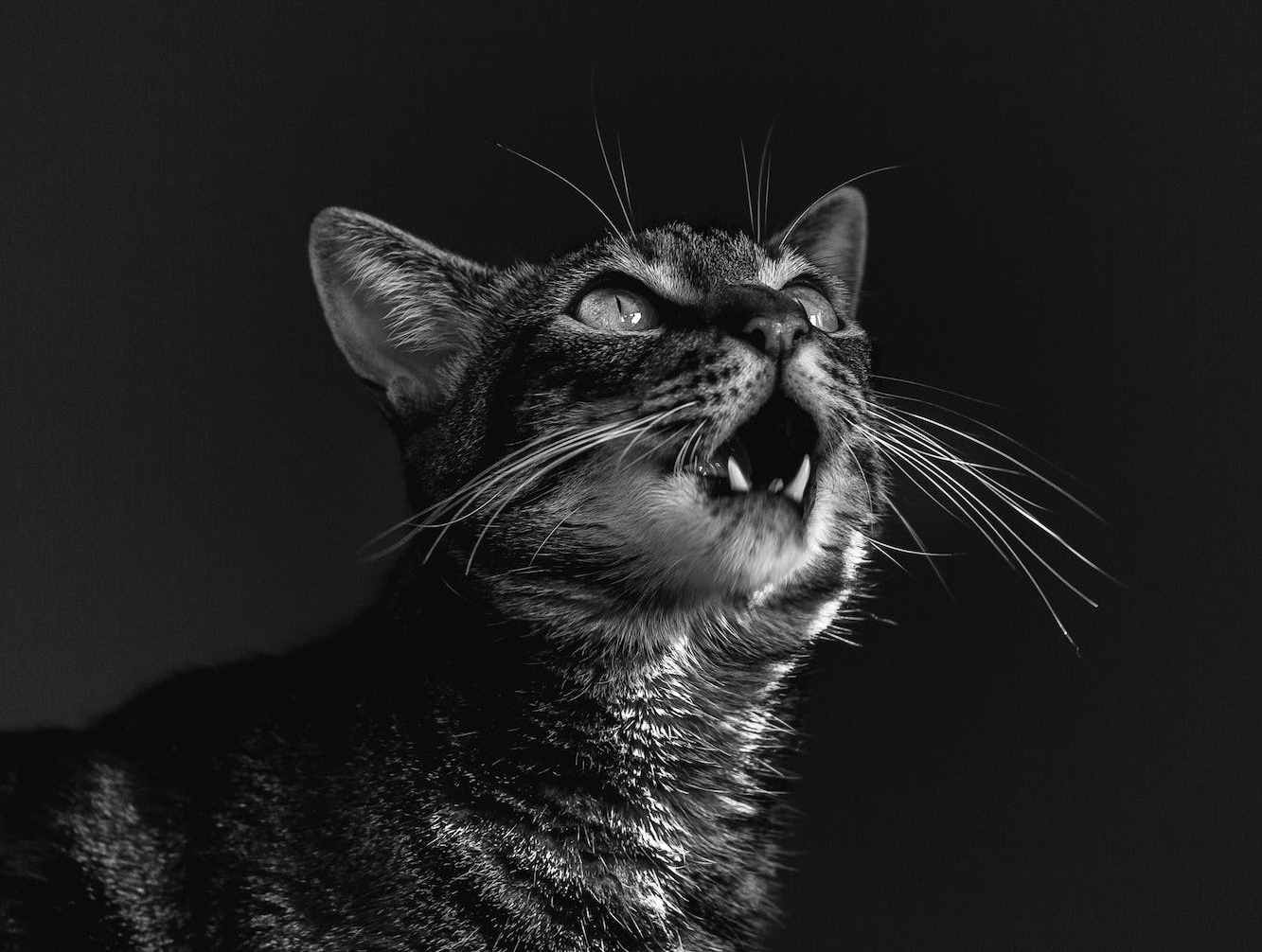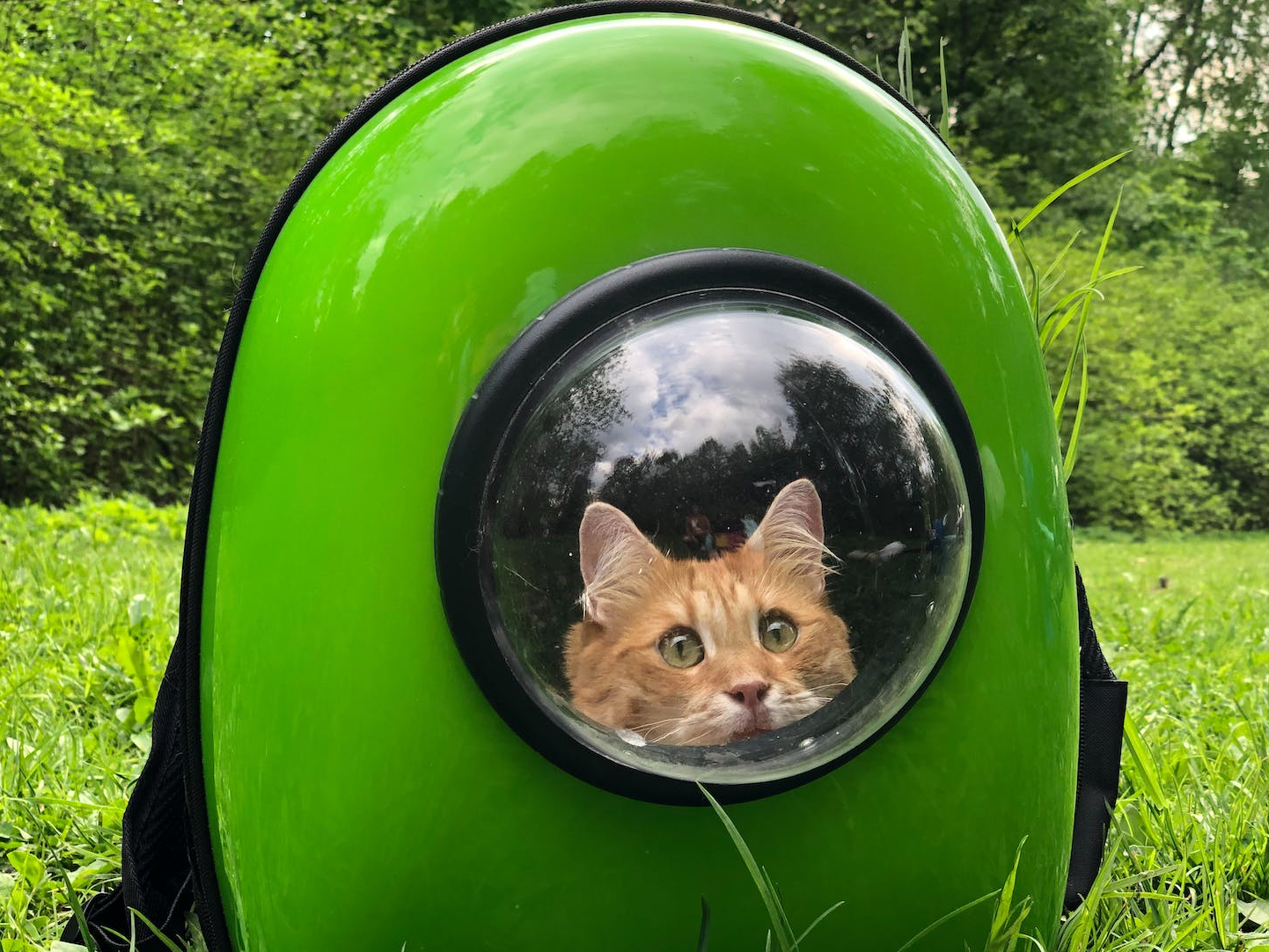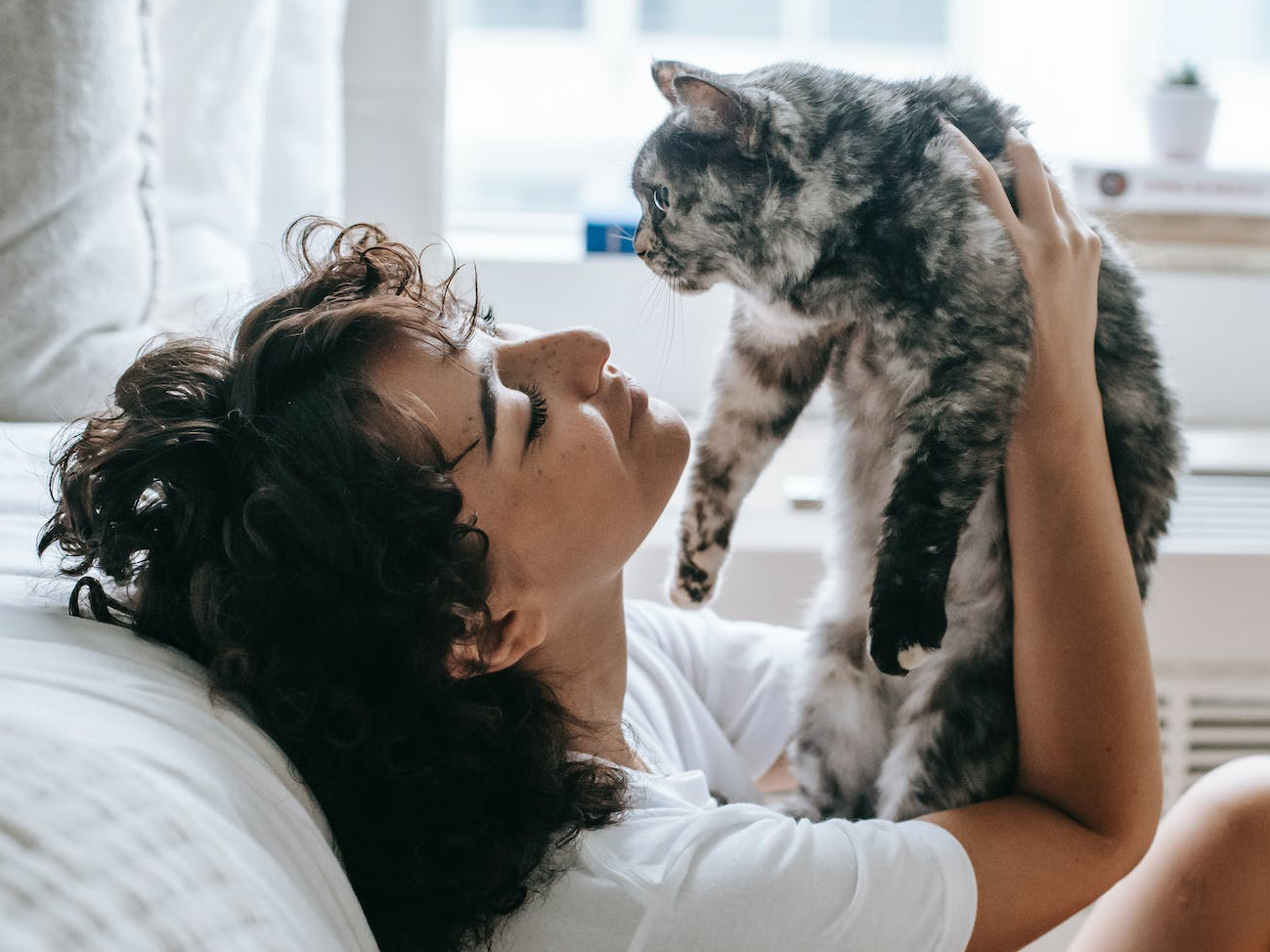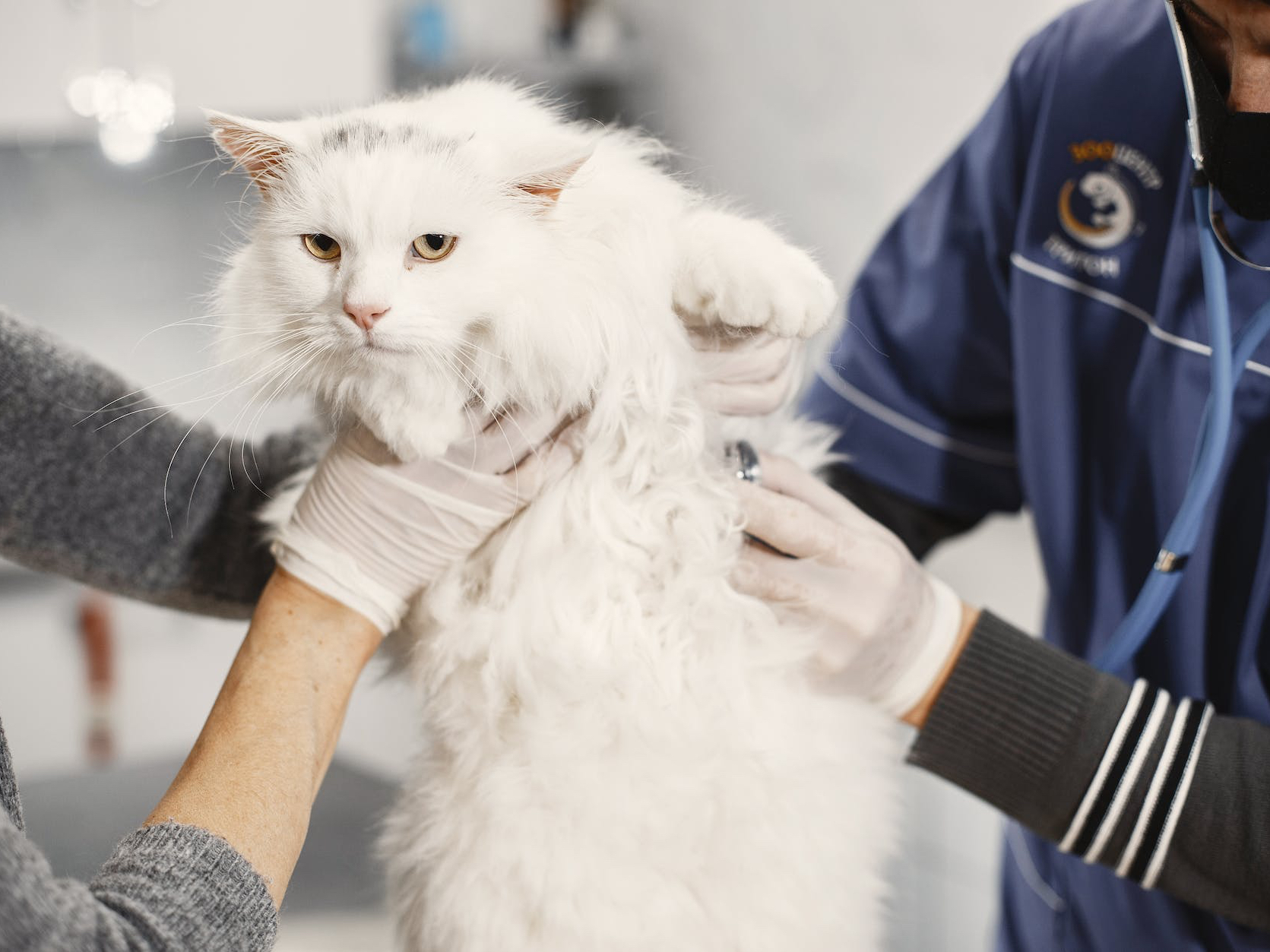Six weeks ago I started working full-time to help out my office. But it will only be about 2 more weeks. Plus, my husband and I made a big decision somewhat recently. It’s something he’s brought up almost yearly. However, it was never the right time. So, due to various reasons, we put our house on the market. Therefore, soon we’re moving to East Texas. Thus, in the midst of all these changes, I wondered, can cats have anxiety and depression.

Once we put our house on the market, we had to clean our house on a daily basis, in case the realtor wanted to show it. I don’t think our house has ever been as immaculate as it is. Furthermore, there couldn’t be any signs of pets: no toys, no food or water bowls, and no pet toilets, aka litter boxes. And there could be absolutely no pet smells.
In addition to all of these daily adjustments to the pet accoutrements, my schedule altered from part-time to full-time. Whereas I once was home every afternoon, now I work everyday, all day long. And there was no slow transition. One day was normal, like any other. The next was something quite different; and it stayed different. Moreover, I haven’t had enough energy to give all of my time and attention to my fur baby.
Symptoms of an Anxious Cat

The majority of animals, including cats, most certainly can suffer from anxiety and depression. Though, they don’t always present exactly the same way. You might have an anxious cat if they are
- More aggressive than usual
- Hissing more
- More vocal, ie meowing more
- Pacing
- Have excessive mood changes
- Perhaps fearful of leaving your side
- Trembling or shaking
- Failing to use the litter box
- Hiding
- Trying to escape
- Lethargic
- Experiencing a change in appetite and possibly weight as well
- Having digestive issues like diarrhea
- Over-grooming, which would end up in bald spots or sores
- and are Vomiting
Symptoms of Depression in Cats

Depression in cats isn’t due to a chemical change in their brains. But it’s usually a sign of a deeper problem. And some of the signs of depression in cats are similar to anxiety, as you’ll see. Signs of depression in cats include
- Decreased appetite and no interest in treats
- Loss of interest in playing with toys
- Less interest in interacting with housemates or family members
- Meowing more
- Less interest in going outdoors, if allowed outside
- Grooming less
- Urinating more
- Failure to use litter box
- Excessive scratching
- Crouched position with tail tucked and ears back
- and Withdrawn: no head butting or kneading your lap
Elements that Influence Anxiety in Cats

There are a variety of things that can cause anxiety in cats, just as with people. In addition, some cats are more likely to have anxiety than others. For example, cats that weren’t socialized much are more likely to have anxiety as are traumatized kitties. Other possible causes of anxiety in cats include
- Sickness or trauma
- Separation anxiety
- A traumatic experience, such as history of abuse, abandonment and natural disaster
- Loud noises
- Changes in the household, ie new members or change in a member of the household’s schedule
- Unfamiliar people, animals, or environment
- Cruelty from people
- Being bullied by other pets
- Car or plane rides
- Being confined in a crate or a carrier
- Not being socialized when young
- Moving to a new home
- Change to their routine
- Boredom
- and Dirty litter box
Factors that Contribute to Depression in Cats

Most of the causes of depression in cats are physical. Although, there are also some causes similar to anxiety in cats. And they deal with environmental stressors. Possible causes of depression in cats include
- Environmental Stress
For example, grieving the loss of a loved one, either animal or human is an environmental stress. Or a change in the home environment, like being bullied by other cats or another pet is another instance of environmental stressors.
Moving is another example of environmental stress.
And change in the family’s schedule is also an example of environmental stress.
- Change in Physical Health
Pain is an example of change in physical health. And many of the signs of pain in cats are similar to signs of depression and anxiety.
Another example of change in physical health is old age. Plus, it can go along with pain, because older cats tend to groom less.
Chronic illness is my last example of change in physical health. Just as with people, cats get depressed with chronic illness and pain. Just some of the chronic issues cats can get are asthma, cancer, IBD, diabetes, and kidney disease.
- and Inadequate Nutrition
Both cats who are underweight and overweight are at risk for sickness and pain. And we already saw that chronic illness and pain lead to depression. So a nutritious diet is essential for a happy, healthy cat.
What You Can do for an Anxious Cat

If your cat is showing symptoms of anxiety, they need to feel safe. So, it’s essential that you
- don’t punish your kitty for being aggressive, or for any other unwanted actions.
All punishing your fur baby will do is exacerbate their anxiety and the undesirable behavior. In addition, you should think of your kitty as a baby.
- talk baby-talk to your feline friend
Studies have demonstrated that cats like it when their owners use pet-directed speech, or what we would call baby-talk. Plus, utilizing pet-directed speech with your kitty nurtures your special bond with them.
- keep a routine with feeding and playtime
Because cats are very prone to routine, any change on our end regarding their care could make them sick. A different study, published in the AVMA Journals, revealed that healthy cats exhibited ill health after familiar habits were altered. If you’re interested, you can find the study here.
- include plenty of mental stimulation
Indoor cats can get bored easily. Thus, if they don’t have much mental stimulation, they’re susceptible to boredom-related and stress-relieving behaviors. But to avoid those unwanted actions, have lots of toys, perches, and cat scratching posts for your kitty. And don’t forget to make time to play with your cat.
- clean the litter box daily
Most cats like a clean toilet, aka litter box. So, it’s ideal to clean it at least once a day. Additionally, refrain from moving your cat’s litter box, which would put added stress on your cat!
- try calming cat pheromone products
I’ve tried the diffusers in the past when we got Cake, and I never noticed a difference. Meow Meow and Cake still didn’t like each other; and the diffusers didn’t seem to chill them out. But when Itty started displaying anxious and depressed symptoms, I decided to give the collars a try. And they work very well. However, that’s in addition to all of the other things I’m doing.
- and reduce competition if you have multiple cats
The main ways to lessen competition between cats is to have multiple feeding and drinking stations, extra litter trays, extra hiding places, and plenty of toys. And be sure to space all of these items throughout your house.
What to do for a Depressed Cat

First of all, I just want to say, this isn’t meant to take the place of veterinary advice. If you know your fur baby has a medical condition, if you suspect one, or have seen evidence of one, call the veterinarian. The following things are what I tried, since I know Itty’s symptoms were environmental–they began after I started working full-time and we put the house on the market. In addition, after a lot of effort on my part, she’s doing much better. Therefore, if your cat is depressed due to a change in his or her environment, you can
- spend time with them
Research has shown that cats would much rather spend time with their owners than get treats or play alone with a toy.
When Itty first presented with symptoms, I still tried to play with her. Sometimes she was receptive. But it never lasted for long.
- get a new toy
If your cat’s depression is due to boredom, getting a new interactive toy could be just the trick.
Again, I got Itty some new toys, a cat tree and scratching post, and more fuzz balls. While she loves a couple of the things I got her, she has yet to even approach the other.
- offer new types of food
Sometimes even changing your cat’s food or litter could make them depressed. And if they aren’t eating as much, or no longer eating, try offering them wet food in tuna flavor. It has added moisture, and is generally better than kibble. I advise tuna simply because our cats love tuna flavor. But even the above mentioned research included food. And tuna was the favorite among felines.
- play cat-specific music
Not too long ago classical music was the go-to choice when playing music for your pets. However, now, as more studies have been done, it makes sense that cats respond better to cat vocalizations.
I admit I hadn’t tried the music until a few weeks ago. When Itty and I started playing, it was how it’s been when she first had symptoms of anxiety and depression. She wasn’t all into it. But she amused me, because she loves me. However, when I put the cat-specific music on, it’s like she woke up. At first, she ran to my phone and sniffed it. She was clearly checking it out. And then she played with more energy than I’ve seen her play in a long time.
- and offer calming pheromones
There are different ways the pheromones can be delivered: diffuser, spray, chews, or collars. I got the collar and the chews. Though, I waited until a couple weeks ago to try the chews. Itty was not impressed with the smell. At least she’s no longer wanting to eat anything and everything. So, we’ll most likely forego the chews, since she won’t touch them.
When to See the Vet

Obviously any time our fur babies are acting out of the ordinary is a cause for concern. And it’s recommended that you call your vet. You absolutely want to rule out any physical causes for anxiety and depression.
Itty had her check-up a couple of weeks ago for vaccinations. Plus, I asked him about her panting when running across the room; not doing heavy play or exercise. Furthermore, I discussed the 13 hour trip we’re making to South Dakota with both her and Sophie in May. On our last vacation, we decided they were going with us on our next trip, since Itty got locked in a bedroom for 3 days. May will be busy. After about 5 or 6 weeks of all that I tried and suggested, Itty was back to herself. Though, not necessarily weight-wise.
Can Other Pets Get Anxiety and Depression

Yes, absolutely, other pets can get anxiety and depression. In fact, dogs get anxiety and depression for similar reasons as cats. Also, some breeds are more prone to anxiety, such as Australian Shepherds. Additionally, some signs are alike as well. Plus, chickens get anxious too. But for different reasons, like predators or overcrowding.
It seems like Itty and Sophie are a pet-match made in heaven. I’m so cued into Itty’s moods, because she’s my baby. Although, during Itty’s funk, I noticed Sophie seemed out of sorts. I’ve been at work most of the time the house was shown. Therefore, the pets had to be vacated as well as the people from our comfy abode. Hence, none of the pets enjoyed the days the house had to be shown to potential buyers. But especially Itty and Sophie. Whereas Itty showed symptoms of both anxiety and depression, I only saw symptoms of anxiety in Sophie. Though, Sophie would still play and eat. They just express themselves differently. While one is an introvert, the other is an extrovert.
I’m happy to say that our house got sold in only 2 weeks. Therefore, our babies didn’t have to deal with the craziness for too long. However, I’m still working full-time until May 1st. Then we go on a 5 or 6 day vacation before packing and moving. And the chickens have absolutely no idea what’s going on.
Can Cats have Anxiety and Depression?

We saw that cats can have anxiety and depression. Additionally, we learned that many things can trigger anxiety in cats, from moving their litter boxes to changing schedules. Plus, depression in cats has similar causes to anxiety in cats. However, it can also be caused by illness and pain. Besides ruling out a physical cause for anxiety and depression, there are many ways of helping our fur babies. The main one being spending time with them.
I appreciate you taking the time to read this post. Please comment and share. If you don’t already follow, please do so now.

